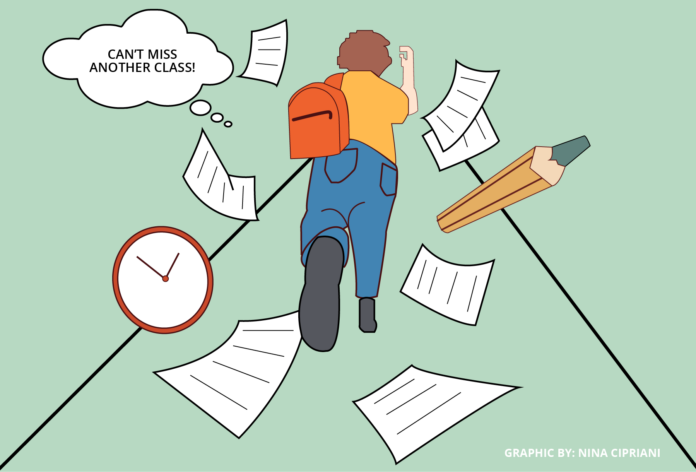Our View is a staff editorial produced collaboratively by the entire Rocket Staff. Any views expressed in the editorial are the opinions of the entire staff.
To review our editorial policy, which includes our blotter policy, click here.
It’s no secret that when one student gets sick, soon the entire campus will be coughing and sneezing.
You wake up in the morning and feel the start of a cold. Thinking about your own health and your peers, you decide not to go to class. Is that the second class you have missed or the third? If you miss another, will your grade drop?
Instructors are responsible for implementing their own attendance policies in each class, according to SRU’s attendance policy. Most class attendance policies say students cannot have more than two or three unexcused absences.
The repercussions of missing classes beyond that limit are up to the professors. At that point, there are a few things that could happen, ranging from receiving a zero for attendance or missing an in-class activity.
But depending on how many days a student has missed, missing another could result in a significant drop in their course grade. Some explicitly state in their syllabi that you will fail the course if you miss a certain amount of class.
Missing out on the lecture is punishment enough in most cases. For some classes, once a class or two is missed, there’s no coming back from that.
Oftentimes, being absent and missing one 50-minute or one one-hour and 15-minute lecture sets a student back, why does it need to be even more stressful by attendance and participation policies?
We aren’t saying these policies need to be removed, but maybe restructured.
Most professors have their own definitions of what an excused or unexcused absence is, and what “proof” of absence a student must have.
For example, a death and funeral can be an excused absence, but some professors require an obituary. Some professors may be as strict that if you aren’t mentioned in the obituary, then it doesn’t count as an excused absence.
Many students come to college to gain responsibility and independence in the pursuit of entering the “real world.” Strict attendance policies do not afford students enough freedom to make conscious decisions about going to class and doing work even when they don’t have to.
This will lead to students not understanding their own tendencies when given freedom, and failing jobs as opposed to failing classes.
In-state SRU students are paying $3,858 for their tuition per semester. Out of state SRU students are paying $7,716. Both of these amounts are for full-time students, which is someone taking 12-18 credits.
Students pay thousands upon thousands of dollars to be enrolled in classes. If they don’t show up to class and are failing, that’s on them.
Either way, the university and faculty are going to get their money, so why are these policies so focused on keeping students in the classroom?
Public high schools receive funding from the state based on attendance and standardized test scores. This means if students aren’t showing up, the school is actively losing money. But universities do not lose money if a few students doesn’t show up to class.
The practice of docking grade points for being sick, depressed, anxious, etc. is outdated and counterproductive. Being punished for attendance can lead to an accumulation of missed classes, and then it becomes a vicious cycle.
At the end of the day, there is too much focus on if students are sitting in the classroom as opposed to the quality of their education and their mental and physical well-being.







